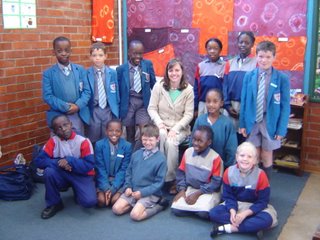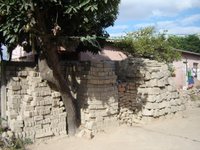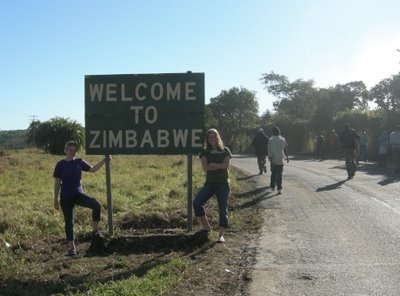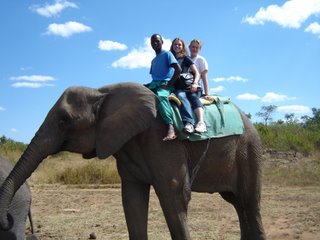Monday, June 19, 2006
My reflection letter
Dear Friends,
I was standing out in a cornfield under a vast, black sky spotted with little diamonds that stretched so far into infinity you couldn’t help but feeling small. The night sky, unpolluted by modern civilization, was clearer than I had ever seen it before in my life. We gathered in this particular village for a night of singing, dancing, testimony, and teaching. We were already several hundred kilometers from Harare, and that evening we ventured into the “bush” just a little farther, and I knew that perhaps I was stepping into that territory that automatically fills peoples’ minds when they hear the word “Africa.” This was it, this place spotted with huts and trees, cornfields, fires and stars for light, straw mats, and intriguing brown faces so full of life and mystery. Yet as small as I felt in the universe standing there under that sky, I felt the presence of something greater, something larger and beyond description. It was, perhaps, the Mystery who was responsible for the mystery in all of creation.
That night was a time that will probably be engrained in my memory forever, as will be many other unforgettable experiences during the month in Africa. We were spending two days at Karanda Mission Hospital in Karanda, Zimbabwe. I met an 11-year-old boy and his grandmother, Faustina, in the pediatric ward. The boy, Nichloey, was HIV positive. I listened to the grandmother’s story in broken English and Shona, with a little help from one of the hospital chaplains. As I was getting ready to go before the lunch hour, I asked if I could pray with them. As I did, Nichloey was half asleep. Though I could see his eyes, he remained expressionless as I made my way out of their corner of the small pediatric room.

The next day, I returned with Meg, my fellow Zim adventurer and partner in ministry. Our hosts (missionaries with TEAM) had given us puppets to use, so we went in after lunch to play and greet the children once again. The cribs were calmer than the chaos I experienced the day before. The mothers were waiting with their babies for their next check-ups, trying to pass the time as peacefully as possible, wondering what on Earth was going to happen next. Little did they know they were about to sing some songs with two American girls and their puppets, who barely knew three songs in Shona. It was a terribly cute sight as little eyes gazed at us, and smiles slowly started trickling faces around the room. The mothers sang along, even if they had to chuckle at the way we pronounced some of the words, like “Zvakanaka kujowapacha” (it is good to be born again). Faustina was there, and seemed to enjoy the activities the most. My heart warmed when I walked back to Nichloey and waved at him in his bed in the corner, and he smiled and waved back.
With 20% of the population affected by HIV/AIDS, we didn’t just come across it in the rural villages or on the outskirts of society. It was everywhere, and everyone we met was affected by it somehow. It was a place where disease, poverty, and injustice stared you right in the face. I was often mentally exhausted, broken, and humbled.

We spent time at a girls’ orphanage in Harare called Hands of Hope. It was home to 14 orphans who lost parents due to AIDS or related illnesses. Tatenda, the smiley little thing that stole our hearts, almost died last year because of it. Marble, the girl in the picture, lost her mom a year ago. She didn’t bother to hide her sadness on the last day we were there. June was the month her mother died, she said. Marble was only twelve. In a letter she wrote to me she says, “I hope God will let us meet again. I really enjoyed the time we spent together and I hope you did. Always remember God loves you and so do I.”

Martha, one of my host sisters, was also orphaned at twelve. She’s sixteen now, and plays a mean game of chess. She taught me how to play, in fact. I find it amazing that she walks 45 minutes to school each way every day. She would leave the house sometimes just as I was getting to the breakfast table just to make it on time. Her adoptive parents can’t afford to put her in private school like their daughter Rue, so she attends a government institution. Still, with increasing numbers of children that don’t even attend school at all – usually orphans in high-density areas like where she used to live – Martha considers herself blessed to even be where she is. Like I said, humbling.

My host family – Kenzias, Jenipher, Tapiwa, Runyararo, and Martha Chibota – is an African family proud of their Shona roots. We enjoyed “sadza” at most every meal, a staple of corn meal and water, along with beans or meat, and cooked cabbage. This was the traditional meal. But more than dietary nourishment, the Chibotas knew the importance of enriching themselves with spiritual food as well. Every evening, we prayed together and shared Bible study. It was a privilege and a blessing to be part of such a reverent family who welcomed me as one of their own, quite literally. I felt like their sister and daughter, and often forgot what color my skin was. ☺ Because in God’s family, there is no race. There is neither Greek nor Jew, slave nor free, male nor female, for we are all one in Christ Jesus (Galatians 3:28).

If I wanted to greet you in Shona, I would most likely say “Mangwanani!” which means “Good morning.” In the Zimbabwean winter, the mornings are by far the longest part of the day (or so it seemed). I enjoyed a month of waking up before the sun, not something I’m accustomed to as a college student! But nevertheless, with a host family such as the one I had to greet me at the breakfast table, I didn’t mind all that much.
They welcomed me along with my desire to serve in their church, Harare East Baptist Church. Harare East is a young branch of Central Baptist Church in Harare, which is led by John Bell and Asafa Makan’a. Being there for just a short time, my responsibilities with them included teaching Sunday school and being in a leadership position in the youth groups (both at East and Central). I enjoyed building relationships with the members of each congregation, especially Harare East as I attended its home group on Wednesday evenings, led by my own host dad, Kenzias. He is the pioneer who, with his initial vision for this new church, faithfully directed it until they were able to call in a full-time pastor, which happened to be the week before I left. It was all very exciting (and still is, as they update me) to be in the midst of what God is doing in their small congregation, and praying along with them as they continue to grow and seek God’s wisdom and guidance.

My other responsibility included working at Gateway Primary School every day that we weren’t taking mini trips elsewhere. I worked with Mrs. Shaw’s fourth/fifth grade Remedial class, twelve rowdy kids I grew to love. Mrs. Shaw was the kind of teacher every kid should have had in elementary school. She made learning fun, and she unknowingly acted as my mentor as I had to get accustomed to a new, British-style, multi-cultural school system. Not only that, but she showed me beautifully what it looked like to honor a Christian worldview and attitude in the classroom. It was a blast. I’ll always remember the time the kids got all wired up to dissect a pig’s brain. Lots of other delightful things happened in that school, and I know I was there for a reason.

I met Gloria, the fun-loving Special education teacher. She is one of two teachers for eight mentally challenged children of all levels. One day I got to hear her story. She lost her mother when she was 15, and her father four years ago. She never got her high school degree, but started working right away. Her sister, after her father’s death, moved to London. She remains by herself to fight for her house their parents left to them, because the government is threatening to take it away. She can barely pay her lawyers. We had tea with Gloria almost every day.

You go to a place like Africa and wonder how and if you’re truly going to be affected, having all these preconceptions about what it’s like and how messed up it is, thinking you maybe already know what you’re going to find. And in a way, you find it. But in other ways, it changes you beyond what you could ever dream up yourself. It’s true that in some sense, you’re just an outsider looking in. A staff member at Gateway said to me matter-of-factly that Zim probably doesn’t seem so bad to us Americans because we don’t actually live there; that we have somewhere to return to. But though we weren’t staying permanently, it doesn’t mean we weren’t affected; because most of the time you’re there you’re immersed in it, waiting in queues for sugar just like everyone else, reading The Herald with your morning tea, fulfilling responsibilities like a true African, making friends who have stories that make you cry; and you begin to realize how deep and how painful the problem is. When you hear bits and pieces of real peoples’ stories, which fit into the larger Story, all I can think of is brokenness. A brokenness so deep that it’s not just in Africa – it’s all over the place. Zimbabwe, Ecuador, Iran, China, New York, Philadelphia. And it’s also in us. It shouldn’t take a trip to Africa to see how broken the world is. And then you begin to realize the significance of what you’re doing. For just a month, your life is intertwining with theirs. You are being affected, because you yourself are experiencing change. You are making a difference, because you realize the responsibility and eternal importance of building those special relationships; the ones that have meaning and stories to tell, of hurt and confusion, despair, pain and every kind of darkness… and you try, only by the Grace you have come to know yourself, to embrace all that with your Story of hope, of healing, and every kind of beautiful light.

When my family took me to Chitungwiza for the day on Africa Day, I’ll always remember Mrs. Chibota’s explanations of how people build houses for themselves in the high-density areas. Several of Mrs. Chibota’s relatives are currently living and building in Chitungwiza, the neighborhood in which Martha grew up just north of Harare. It’s a beautiful process, really. It takes a tremendous amount of patience. They start with the lot, the property they wish to build on. So they get permission to do so, and then build as much as their bank account allows. Because you need the money up front to buy any kind of construction materials or anything in Zim for that matter, materials are bought piece by piece, and little by little a house is built. And they just go on like that, until one day, their house is finished.


I believe God’s kingdom is built in a similar way. It may take tremendous amounts of time and effort, but each piece is well earned and valued. Step by step, the Father will see His houses to completion, each one fearfully and wonderfully crafted. Desmond Tutu once said, “One of the ways of helping to destroy a people is to tell them that they don’t have a history, that they have no roots.” In Zimbabwe, you find people have incredible roots and tradition. They have unbelievable stories. And in God’s family, we have an incredible history, too, and an unbelievable Story to share. And we continue to build until one day, the God who began a good work in us will complete it on the day of Jesus Christ (Philippians 1:6). Our stories and foundations keep us going. We shall not be destroyed, nor shall we be overcome by hopelessness.


Thank you for sharing this journey with me. Mwari oga ndiye anoziva zviri mberi. God alone knows what lies ahead.
Peace,
Ashley Kern





